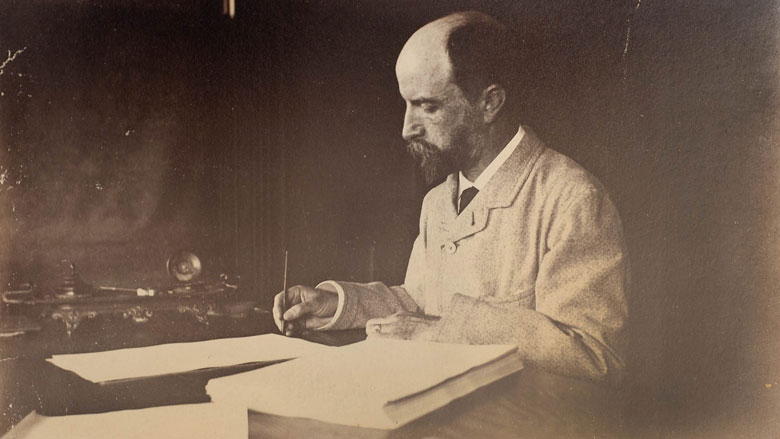Conservatism’s identity crisis
By Glen A. Sproviero | March 8, 2016, 6:10 EST
 Henry Adams seated at desk in study. (Wikimedia)
Henry Adams seated at desk in study. (Wikimedia) Henry Adams famously opined that he could single-handedly disprove Darwin’s theory of evolution by tracing the lineage of the American presidency from George Washington to Ulysses Grant. We could only imagine how much more steadfastly he would adhere to this observation in the era of Hillary Clinton and Donald Trump – our age of desecrated politics and ideological frenzy.
As a traditional conservative, I have been appalled and disappointed by the direction of the conservative movement since the late 1990s. I am particularly frustrated that the term conservative has become an all-encompassing repository for any right-leaning political theory, despite the fact that many of them have little in common with traditional conservatism. In trying to represent everything, conservatism has begun to represent nothing.
While conservatism has eluded easy definition since its first appearance in the political lexicon over two centuries ago, the notion that conservatism is predicated upon certain ideologically charged theories of government such as libertarianism, populism, or democratic-capitalism, is to either misunderstand its meaning or to disingenuously propagate these markedly un-conservative theories under the rubric of an otherwise respectable enterprise. Conservatism is the rejection of ideology, not an ideology itself. Therefore, when conservatives seek to form their social and political beliefs into a systematic theology, they cease to be conservative.
The Republican Party has long been a vehicle for the communication of conservative ideas in American politics. It was for generations the party of Abraham Lincoln, Teddy Roosevelt, Robert Taft, Barry Goldwater, and Ronald Reagan, but in recent years, it has degenerated into the party of Wilsonian internationalism and libertarian extremism. It has adopted various ideologies and provided these vulgar ideas with respectability on the right. Instead of conservatism shaping the GOP, the GOP began to shape conservatism.
In abandoning its role as the soul of the Republican Party, conservatives in the late 1990s and early 2000s were happy to be part of a winning team no matter the cost. This led the GOP to lose its balance, its sense of purpose, and its philosophical spirit. It has become hostile to ideas and nominally anti-establishment (I say nominally because Donald Trump, despite not have held elected office, is anything but an outsider). In some quarters it reflects a dogma that is practically indistinguishable from the intemperate political fanaticism of the angry left. It tolerates childish bravado, puerile vulgarity, crass anger, and unpolished populism. It has been hijacked by a loud mouthed plurality of insurgents whose only political principles are premised upon unrestrained individualism and the supremacy of the voice of the people.
This problem is not entirely new, but the effects of the triumph of a tawdry political conservatism, in contrast to an elevated conservatism in the tradition of Edmund Burke and Alexis de Tocqueville, is now a substantial problem that is splintering the conservative movement, both intellectually and politically. As conservatism gradually became more sullied by the effects of big-tent Republicanism and its devotion to unfettered individual freedom, along with an unyielding faith in democracy and the free markets, it abandoned the mantle of prudence in favor of the dagger of armed doctrine. Conservatives stopped being conservative and unwittingly joined the ranks of the ideologues they once rejected.
But even in the midst of ever-deepening philosophical quagmire, conservatives should remain hopeful. We must remember that apparent defeats and short terms losses are often the prelude to long term victories. A prolonged GOP primary fight is forcing the Republican Party, and the broader conservative movement, to reevaluate its philosophical predicates and to reconsider longstanding alliances.
While traditional conservatives, libertarians, and neo-conservatives must fight together in their opposition to big-government socialism and totalitarian statism, they must recognize the deep differences that separate them. A generation spent ignoring these divisions, and pretending they do not exist in an effort to fuse them together, is one of the principal causes of our present discontents. We can no longer afford to remain naïve to the weaknesses and dangers of the quasi-conservative ideologies that are sold by the chattering classes as authentic conservatism. None of them represent conservative ideas and each hinders the prospect of a forceful opposition to the radical left. In essence, the conservative movement can only remain a viable social and political force if it is genuinely conservative.
While the Republican Party has for generations subsisted as the political vehicle of a broad philosophical coalition, the failure of the conservative movement to reject ideological extremism within its ranks has allowed certain crude theories of government to slowly adopt the cloak of legitimacy. This transformed the GOP into a potent political weapon for right-wing ideologues, while turning the traditionalists who once formed the core of the Republican Party into irrelevant nay-sayers. But like all radicals, an ideologically charged GOP is devouring itself. If it is to have a future, traditional conservatives must make an affirmative argument for the merits of an authentic conservatism and demonstrate that political populism and absolute individual freedom are irreconcilable with the principles of order, justice, and freedom.
Traditional conservatism is the GOP’s only hope to remain relevant in American politics. Its failure to reassert itself will result in more Donald Trumps, more foreign wars, and an increasingly bloated federal government. And we will only have ourselves to blame.
More importantly, traditional conservatism is what makes the GOP worth saving. For what would conservatives profit by saving a party that works against them?
The silence is deafening.
Glen A. Sproviero is a commercial litigator in New York. Read his previous columns here.












